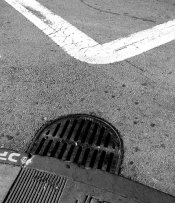He stood on the corner. Not a corner, the corner, and not because this corner was anything special. It was just the corner he was on. The corner he always started from.
Two streets crossed here. It was night. Cars went by.
He knew the house. To get there, he had to go away from here.
He began to walk. There were a number of right-hand turns. To get there necessitated a number of compensating left-hand turns. It took a verifiable amount of time to reach his destination.
That there were other ways to get there was not immaterial or inadmissible so much as simply unallowable deviation. Profane deviation.
When he arrived, when he was there, there was her house. No lights, no car. A modest house, brick, small, perfectly rectangular—in a decaying neighborhood that was never anywhere significant when it was new.
His neighborhood.
He walked up the path of stones laid in the grass. It went from the driveway to the front door. He pushed the doorbell button. He pushed it again. No moving inside, nothing. Even as he heard the bell, it was as if something were broken.
Not home took some time to occur to him.
The church. He was saved. He would go there. He turned around, facing down the driveway to the street where cars passed by, lowriding, booming, flashing, slowgoing. To get to the church.
To get to the church he had to go back. All the way back. To where he started. He took a number of right-hand turns. This necessitated a number of left-hand turns.
He stood on the corner. The same corner. He knew where the church was now. He started walking.

